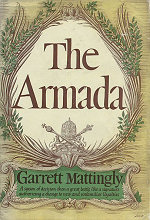
MATTINGLY : The Armada (fülszöveg)
[1959]
The defeat of the Spanish Armada was not only the first modern naval battle, but a climactic event in the birth of modern Europe. Here the story is told in vivid detail, from original sources, as a part of the larger drama of diplomacy in the age of Elizabeth.
The curtain rises on the execution of Mary Queen of Scots, the first act in a drama which would not be resolved until the ships of the Catholic King of Spain had been scattered in the North Sea, his French ally the Duke of Guise murdered at Blois, and England's Elizabeth secured on her throne and her realm saved from invasion. This crucial period of less than two years—from February 1587 to December 1588—is presented in a series of dramatic scenes, sometimes through English, sometimes through Spanish eyes.
We see a world that like ours today, is divided into two ideological camps, a world that longs for unity and peace. We see Queen Elizabeth reigning over a turbulent nation with no standing army and scanty revenues, a woman with only the love of her people to depend on. We see the Spanish ambassador intriguing to split France so that she may be immobilized while Spain attacks England. We see the Duke of Parma, greatest captain of his age, planning the invasion of England from the Netherlands, under protection of the Spanish fleet. We see Philip II of Spain, ruler of more of the earth's surface than any other man since the beginning of history, toiling over his papers in the Escurial, planning the great crusade, the "enterprise against England." Meanwhile, along his coast, looting and burning, ranges Francis Drake, son of a Devonshire parson, who—like Samson against the Philistines—is waging his private war against the King of Spain.
After many false alarms, against a background of diplomatic maneuvering and overt fighting, the great fleet at last sets sail. The second part of this history is devoted largely to the naval engagement itself, a blow-by-blow account from the first sight of the Armada off the Scilly Isles to the return of the broken remnant to the ports of Spain. All Europe watched the battle with breathless suspense; the fate of all Christendom hung in the balance. The English victory demonstrated that religious unity was not to be imposed by force, and the modern pattern of independent national states was free to emerge. And, as proved in 1940, the defeat of the Armada influenced history in another way:
"Its story, magnified and distorted by a golden mist, became a heroic apologue of the defense of freedom against tyranny, an eternal myth of the victory of the weak over the strong, of the triumph of David over Goliath. It raised men's hearts in dark hours, and led them to say to one another, 'What we have done once, we can do again.' "